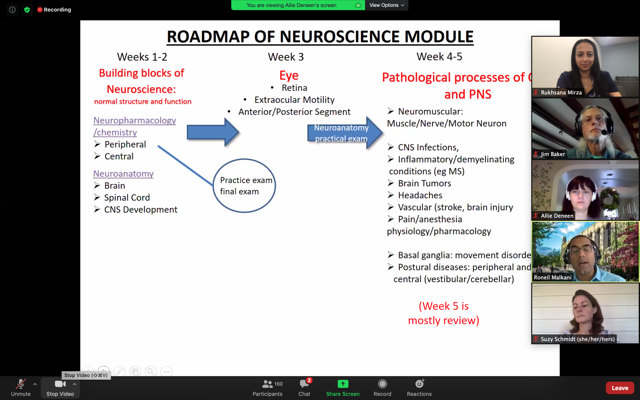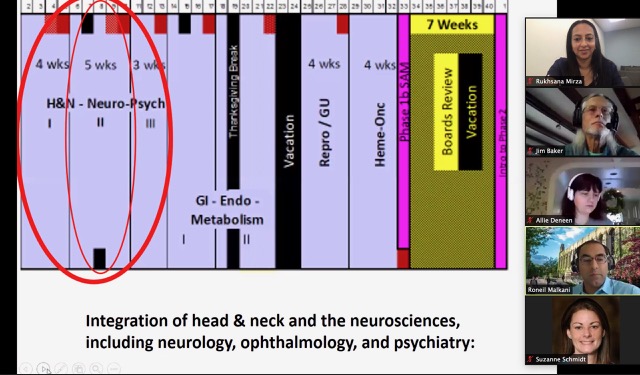Curriculum
Welcome to the Department of Ophthalmology at Northwestern. My goal as Director of Medical Student Education is to provide our students with an exceptional clinical experience and comprehensive didactic curriculum in Ophthalmology. Our faculty (full-time and contributed) consists of dedicated teachers who are at the forefront of their specialties.
We believe all medical students should possess core skills in ophthalmology upon completion from medical school. It’s our goal to provide medical students with an exceptional clinical experience and comprehensive didactic curriculum in ophthalmology.
First Year
There are many opportunities to get involved in ophthalmology early in training, be it through shadowing opportunities with practicing physicians or in the Ophthalmology Interest Group. Feinberg Ophthalmology faculty participate as preceptors at the Community Health Clinic, which is a student run clinic that allows students to take care of our underserved community. Students also have the opportunity to participate in an Area of Scholarly Concentration project in ophthalmology. This is a dedicated research requirement that leads to poster presentations and the goal of a first author paper. Students are guided through this process by a dedicated research mentor as well as resources within the medical school.
Second Year
In the second-year, students learn Ophthalmology through the Head & Neck as well as the Neuroscience Modules. Here, students are introduced to Ophthalmology through a series of lectures that are both live and recorded in a blended learning approach. There is also a dedicated orbital anatomy course in which faculty and ophthalmology residents guide orbital dissection. The eye week culminates in the M2 Clinical Skills session. Students come to the Ophthalmology clinic and are taught in small groups by preceptors to perform the basic eye exam that would be done at a bedside consult. Students then have the opportunity for real life clinical practice on both dilated and un-dilated eyes.
Throughout the second-year students are encouraged to continue shadowing ophthalmologists and taking part in research.


Clinical Years
During the M3 and M4 years students have the opportunity to rotate in the Ophthalmology Clinic through a Two Week Selective and/or a Four Week Elective rotation
Two-Week Selective
The Two-Week Selective Rotation provides a comprehensive overview of ophthalmology and exposure to the subspecialties of ophthalmology. Students also have the opportunity to see ophthalmological surgical cases in the Lavin Pavilion Operating Room and in the Lurie Children’s Hospital.
Four-Week Clerkship
The Four Week Clerkship offers exposure to ophthalmology with both medical and surgical experiences at one or more of the component units of Northwestern Medicine, LCH, and Lurie Children’s Hospital. The four-week elective provides an in-depth view of Ophthalmology generally focusing on 1-2 subspecialties. Prerequisites include: Medicine, Surgery, ObGyn or Neurology. Attendance is expected at weekly grand rounds conferences on Friday mornings and at lectures. A presentation at grand rounds is expected at the end of the 4-week rotation. Students are expected to achieve a working knowledge of the fundamentals of an ophthalmologic examination and core ophthalmic knowledge as outlined by our clerkship objectives. A final exam is given for the four week clerkship. Residents and attending physicians provide a written evaluation of each student.
IC2 Clinical Skills Session
All third year students also spend an afternoon in Ophthalmology in January as part of the Interdisciplinary Curriculum for Phase 2. Approximate 160 students spend the afternoon immersed in Ophthalmology through two interactive sessions. The first session is an advanced clinical skills session that takes place in the Northwestern Ophthalmology Clinic. Students have the opportunity to practice using the slit lamp and direct ophthalmoscope, and are observed doing the bedside ophthalmology exam. Standardized patients are used during this session. The second session is another interactive session with the objective to relay core ophthalmic knowledge. In past years, a red eye “Jeopardy” format was used. More recently a set of cases that exemplify common ophthalmology diagnoses seen on the wards has been developed. The exercise allows students to verbalize pertinent positives and negatives when “Calling and Ophthalmology Consult”. At the end of this day, the department hosts an event where the entire class can hear more about a career in Ophthalmology and meet informally with residents and faculty.
Matching
There is a robust advising system in place for the students who want to pursue a career in ophthalmology. Every student meets with Dr. Rukhsana Mirza, Director of Undergraduate Medical Education in Ophthalmology, as well Dr. Nicholas Volpe, Department Chairman, in many informal and formal sessions to review their completed applications and work on strategy for the match This includes a review of the student’s CV, strategizing away rotations, and discussion about residency interviews (questions/processes/timelines). In the fall there is a formal career advising session for the phase 2 students held in the department.